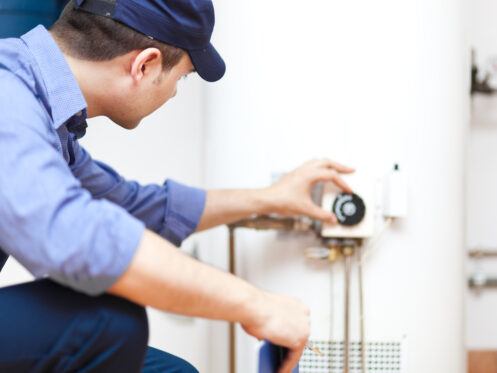Earth Day is celebrated every year to honor the achievements of the environmental movement. It also serves as a reminder of every person’s responsibility to protect the Earth’s natural resources. In the US, it is celebrated on April 22, while the rest of the world commemorates it on the day the spring equinox occurs. During this event, it is vital to remember the benefits of adopting more sustainable practices in your daily activities, including water usage. Here are some eco-friendly solutions that can help reduce wastage of water and energy.
1. Use Low-Flow Plumbing Fixtures
71% of the earth’s surface is covered with water, and the oceans hold about 96.5% of it all. The rest is found in the rivers, lakes, and the ground, as well as in vapor. However, only about 1% of the total amount is available for human use. People spend large volumes of water in their homes every day in the bathroom, kitchen, and garden.
One simple way to cut down on water consumption and waste is to install fixtures that allow a lesser amount of water to flow without compromising the working of the system. These include faucets, showerheads, and toilets. Low-flow fixtures can maintain the desired water pressure and meet the goal of water conservation by using aerators. When the water passes through the fixture, the aerator introduces air into the stream to keep the pressure high.
Taking a shower or a bath consumes the largest amount of water used in a home because the water continues to run even as you lather your body. With multiple family members, the water bills can be very high. You can use high-efficiency shower heads to reduce water usage from 2.5g GPM to as low as 1.5 GPM. There are also highly efficient faucets and toilets you can invest in. Low-flow faucets typically use 1.5 gallons per minute (GPM) or less, compared to the standard 2.2 GPM. With low-flow technology, your toilet can use 1.6 gallons per flush or less, which can save thousands of gallons of water per year compared to older, less-efficient models. These fixtures not only help reduce your water bills but can also improve the beauty of your home.
2. Water and Energy Efficient Appliances
Most homes have appliances that are old and inefficient. You can upgrade the outdated ones with water and energy-efficient models. Modern dishwashers and washing machines are designed to use less water and energy than their traditional counterparts. These appliances have advanced technologies, such as soil sensors and load-sensing mechanisms. They can reduce water and energy usage depending on the size and dirt level of the load. For instance, ENERGY Star-certified washing machines minimize water use by about 33% and consume 25% less energy.
3. Choosing the Right Pipes
The piping system affects water and energy use. During the cold season, a lot of energy is lost as hot water travels through uninsulated pipes. Water heaters have to work harder to keep up with the desired temperatures. Insulating them reduces the heat loss. You can use pre-insulated pipe supports to separate metallic holders from being in contact with metal on the pipes. This cushion prevents energy transfer to the surrounding materials. Additionally, adding isolators can reduce energy loss by acting as a buffer between the pipe and surrounding metals.
Piping materials have different thermal properties that influence energy efficiency. Plastic pipes have various thicknesses and have reduced heat loss, unlike metallic pipes, which have high conductivity. They also have smooth surfaces that reduce friction, so your system uses less energy to force the water through. Depending on your water needs, it is vital to get a suitable diameter for the pipes. This is because more energy must be used to create pressure when the pipes have large diameters.
4. Prevent Corrosion and Blockages in the Piping System
Keeping the plumbing system clean can reduce energy use as there is a clear path for water flow. The pump requires less energy because it does not have to push water past blockages. Corrosion can contribute to blockages in the pipes, as rusted flakes can accumulate and swell. To keep your metallic pipes from rusting, galvanize them. This is the process of covering the pipe with a zinc coating to remove the surface where water and oxygen can reach to create rust. This also strengthens the pipes.
Alternatively, use sealants, especially if you are in geographic areas where the environment is salty or there are many corrosive materials. These tend to seep through crevices and spread within the pipes. When it gets weak, there can be a leakage, which leads to water wastage. Adding silicone sealants to any gaps keeps the harmful elements from getting into metallic pipes.
5. Solar or Tankless Water Heaters
About 18% of all energy used in homes is spent on heating water, and this energy is often generated from fossil fuels that contribute to greenhouse gas emissions. To reduce energy bills, use renewable and clean energy sources, including solar.
Solar panels convert energy from the sun into electrical power. Even though the initial investment cost is high, you may not have to incur more costs unless during maintenance and repairs. Besides, these systems have higher energy efficiency than other forms of energy because they can convert about 80% of the radiation to energy. This is transferred to a storage tank, where the water is heated and kept ready for use.
If you’re not ready to go solar, consider switching to a tankless water heater. A traditional water heater wastes a great deal of energy by keeping a large tank of water hot. With a tankless system, the water is heated on demand. This results in a nearly endless supply of hot water.
6. Fix Leaks
Did you know a pipe that leaks one drop every second can lead to a loss of 3,000 gallons of water per year? This results in higher bills and potential water damage in your home. Hidden leaks can also occur. That’s why it is vital to regularly check the water bills and contact a professional plumber when you notice a sudden spike. They have special tools to diagnose areas where there are leaks. Also, ensure you schedule regular maintenance services for your plumbing system so that the plumber can notice and fix the issue on time.
7. Rainwater Harvesting
While some states ban collecting rainwater, there are no restrictions on this in Nebraska. During the rainy seasons, you can collect and store rainwater for use in the drier months. The stored water can later be used in domestic chores or irrigation. For efficient rainwater collection, install gutters on your roof to direct the water to barrels, cisterns, or water tanks.
When celebrating Earth Day, ensure you conserve water and energy at your home by making changes in the sectors that may be causing losses. Our plumbers at John Henry's Plumbing, Heating, Air, and Electrical can help you ensure your plumbing system is eco-friendly by suggesting upgrades and making repairs. We also have qualified electricians and HVAC technicians who provide services throughout Lincoln and Omaha, NE. Contact John Henry's Plumbing, Heating, Air, and Electrical today for HVAC, plumbing, and electrical systems installation, repair, maintenance, and replacement services.

